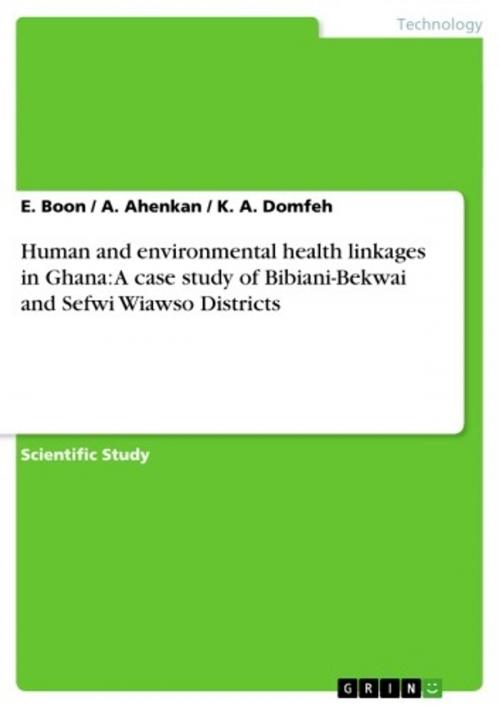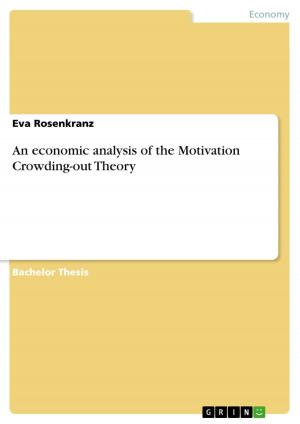Human and environmental health linkages in Ghana: A case study of Bibiani-Bekwai and Sefwi Wiawso Districts
Nonfiction, Science & Nature, Nature, Environment, Environmental Conservation & Protection| Author: | E. Boon, A. Ahenkan, K. A. Domfeh | ISBN: | 9783640132317 |
| Publisher: | GRIN Publishing | Publication: | August 7, 2008 |
| Imprint: | GRIN Publishing | Language: | English |
| Author: | E. Boon, A. Ahenkan, K. A. Domfeh |
| ISBN: | 9783640132317 |
| Publisher: | GRIN Publishing |
| Publication: | August 7, 2008 |
| Imprint: | GRIN Publishing |
| Language: | English |
Scientific Study from the year 2008 in the subject Environmental Sciences, grade: B, , 69 entries in the bibliography, language: English, abstract: Health, environment and poverty are closely interrelated and inseparable, particularly in developing countries. WHO estimates that environmental factors are the root cause of 25% of the total burden of disease worldwide and account for about 35% in sub-Saharan Africa (SSA). Effective environmental management is the key to avoiding a quarter of all preventable illnesses which are directly caused by environmental factors. In the Bibiani-Bekwai and Sefwi Wiawso Districts of the Western Region of Ghana, the environment has been altered by complex human induced factors, which have negatively impacted on the health of the population. This paper seeks to establish the major causes of environmental and human health degradation and whether there is a direct link between environmental degradation and human health in Bibiani-Bekwai and the Sefwi Wiawso Districts in the Western Region of Ghana. Four complementary approaches were used during the investigation: extensive literature review, consultations with key informants, the administration of questionnaires, and stakeholder consultations. The data was analyzed using SPSS to establish the linkages between environmental deterioration and human health in the two districts. The results clearly suggest that environmental degradation seriously affects human health in the two districts. 80% of the ailments in Bibiani-Bekwai and Sefwi Wiawso Districts are attributable to poor environmental health and sanitation and lack of access to good drinking water. Never in the history of mankind has greater attention been given to environment and health (Agyemang et al., 2007). It is estimated that 80 percent of all sickness in the world is attributable to poor environmental factors (WHO, 2007; Housewright and Mihelcic, 2002; Shimkim et al., 2005). Environmental related diseases represent an enormous global public health challenge, particularly in developing countries and impoverished communities (WHO, 2007; Shimkim et al., 2005). Health and well being of humans cannot be separated from the natural environment (Millennium Ecosystem Assessment, 2005; WHO, 2008). Human health and environmental issues have become a major concern in the world and have received considerable political recognition since the 1970s. In its broadest sense, environmental health comprises those aspects of human health, diseases, and injury that are determined or influenced by factors in the environment (WHO, 1997).
Scientific Study from the year 2008 in the subject Environmental Sciences, grade: B, , 69 entries in the bibliography, language: English, abstract: Health, environment and poverty are closely interrelated and inseparable, particularly in developing countries. WHO estimates that environmental factors are the root cause of 25% of the total burden of disease worldwide and account for about 35% in sub-Saharan Africa (SSA). Effective environmental management is the key to avoiding a quarter of all preventable illnesses which are directly caused by environmental factors. In the Bibiani-Bekwai and Sefwi Wiawso Districts of the Western Region of Ghana, the environment has been altered by complex human induced factors, which have negatively impacted on the health of the population. This paper seeks to establish the major causes of environmental and human health degradation and whether there is a direct link between environmental degradation and human health in Bibiani-Bekwai and the Sefwi Wiawso Districts in the Western Region of Ghana. Four complementary approaches were used during the investigation: extensive literature review, consultations with key informants, the administration of questionnaires, and stakeholder consultations. The data was analyzed using SPSS to establish the linkages between environmental deterioration and human health in the two districts. The results clearly suggest that environmental degradation seriously affects human health in the two districts. 80% of the ailments in Bibiani-Bekwai and Sefwi Wiawso Districts are attributable to poor environmental health and sanitation and lack of access to good drinking water. Never in the history of mankind has greater attention been given to environment and health (Agyemang et al., 2007). It is estimated that 80 percent of all sickness in the world is attributable to poor environmental factors (WHO, 2007; Housewright and Mihelcic, 2002; Shimkim et al., 2005). Environmental related diseases represent an enormous global public health challenge, particularly in developing countries and impoverished communities (WHO, 2007; Shimkim et al., 2005). Health and well being of humans cannot be separated from the natural environment (Millennium Ecosystem Assessment, 2005; WHO, 2008). Human health and environmental issues have become a major concern in the world and have received considerable political recognition since the 1970s. In its broadest sense, environmental health comprises those aspects of human health, diseases, and injury that are determined or influenced by factors in the environment (WHO, 1997).















